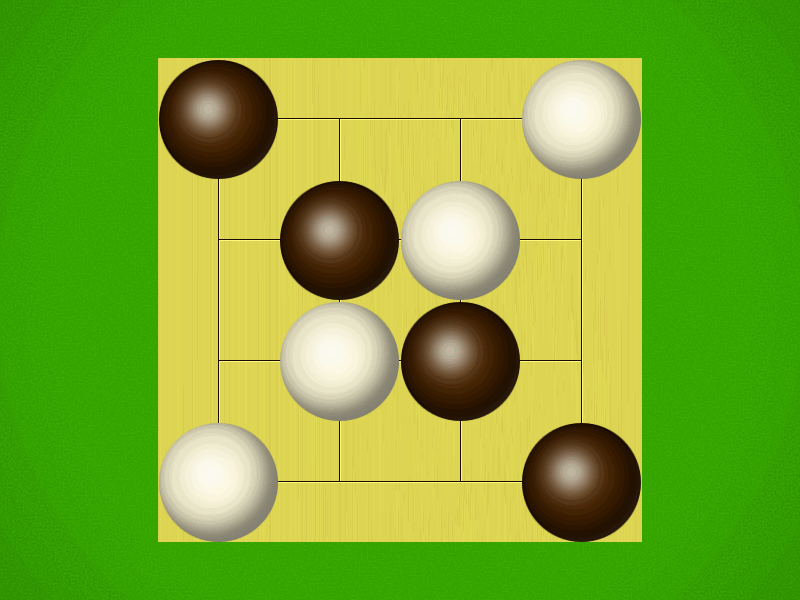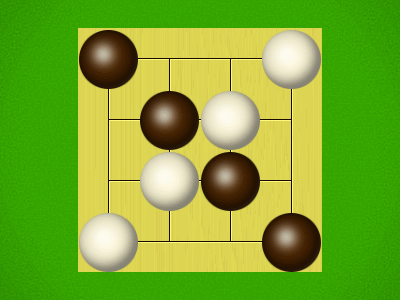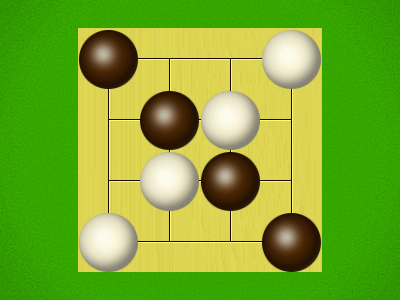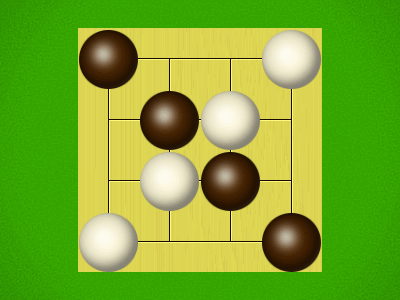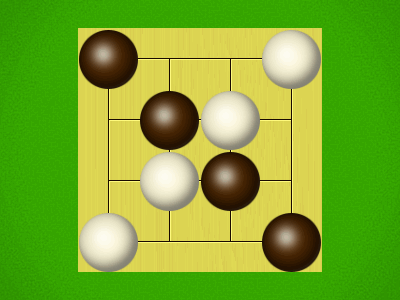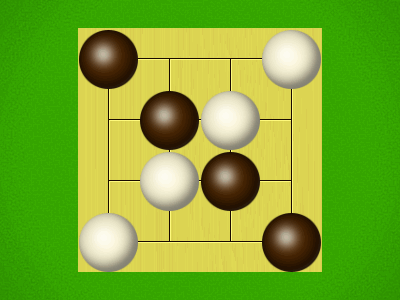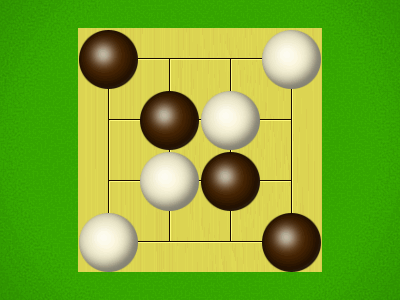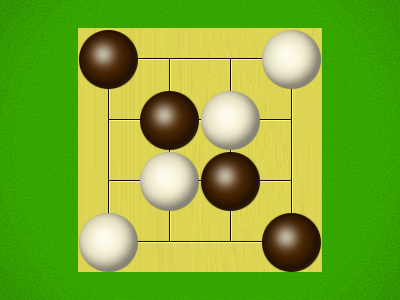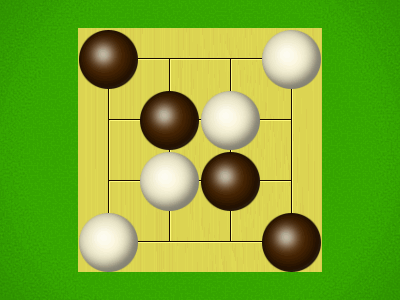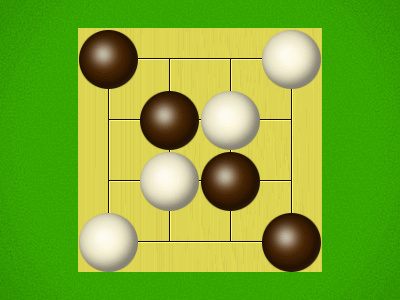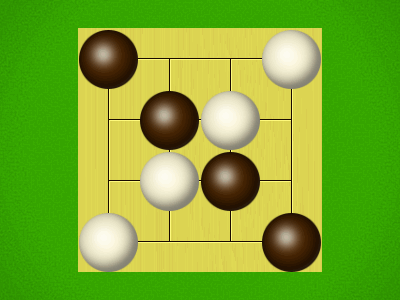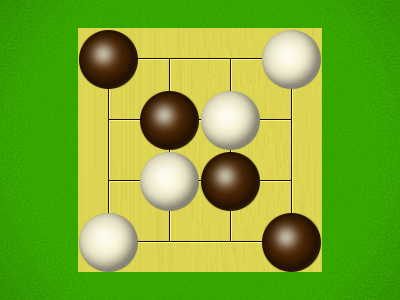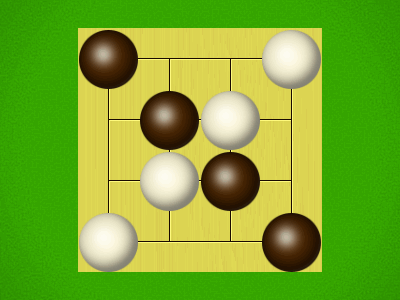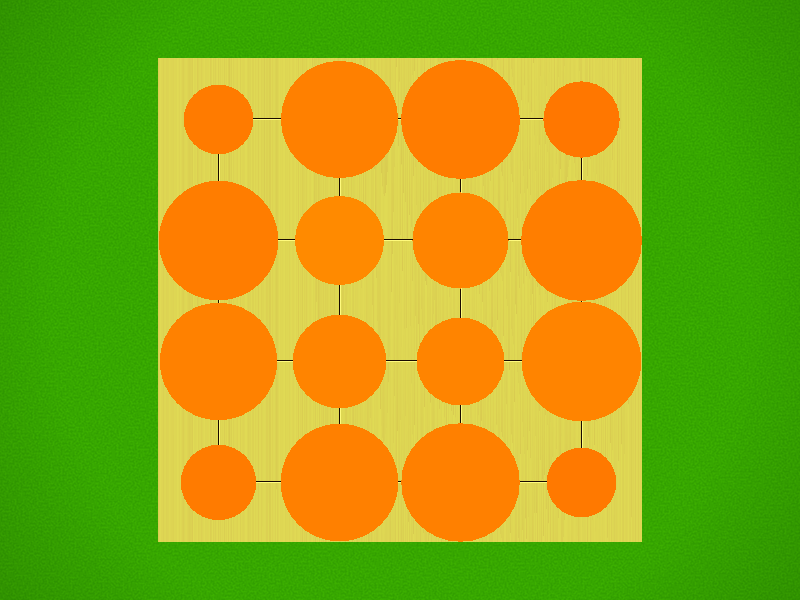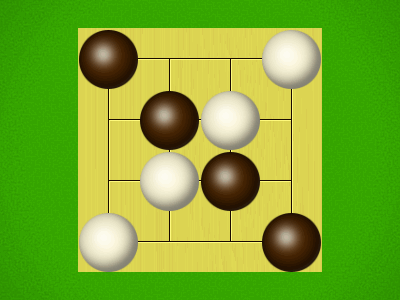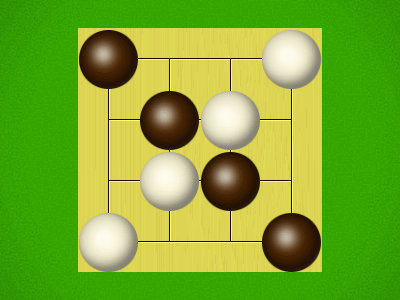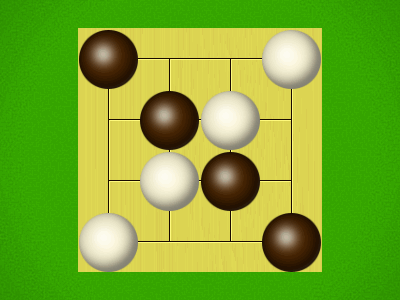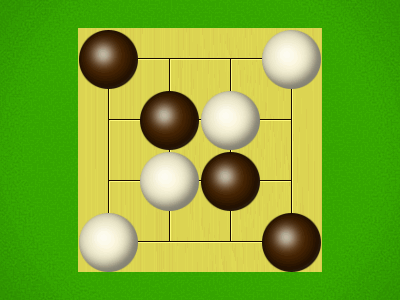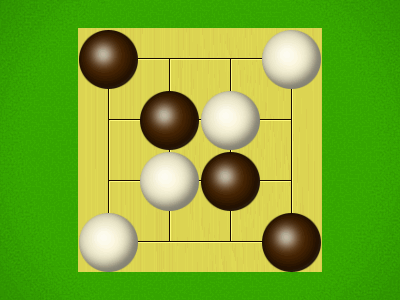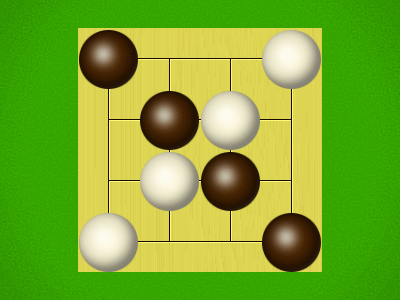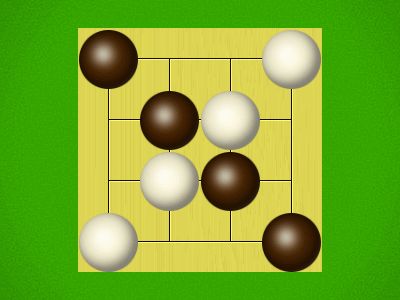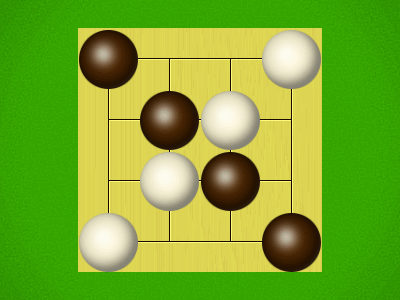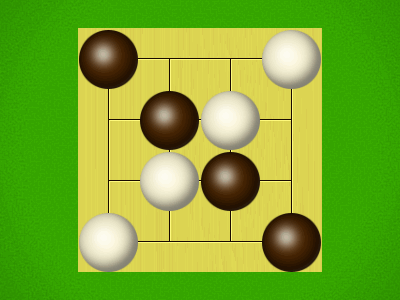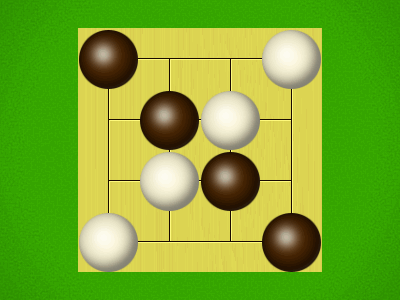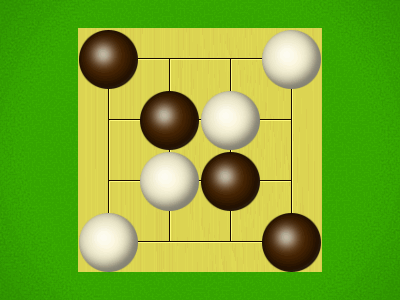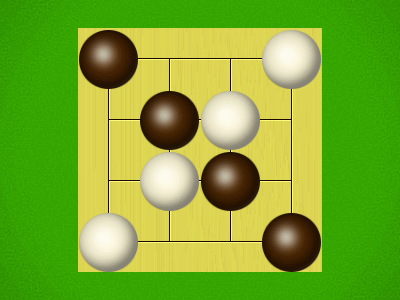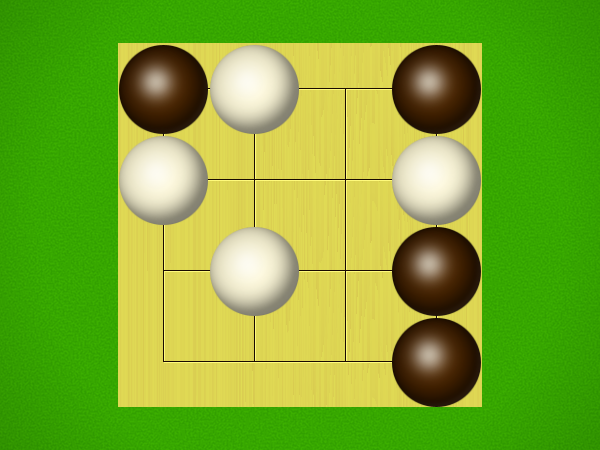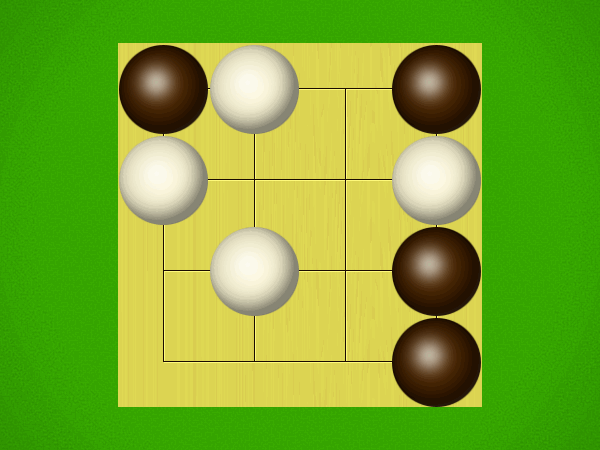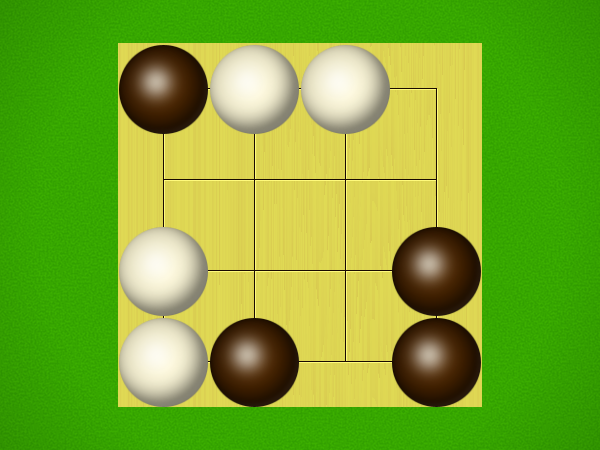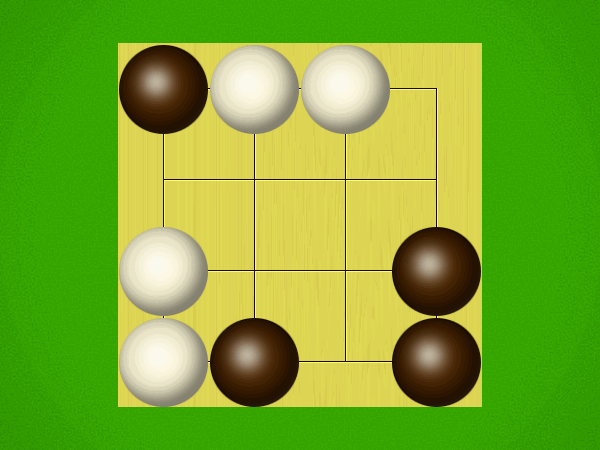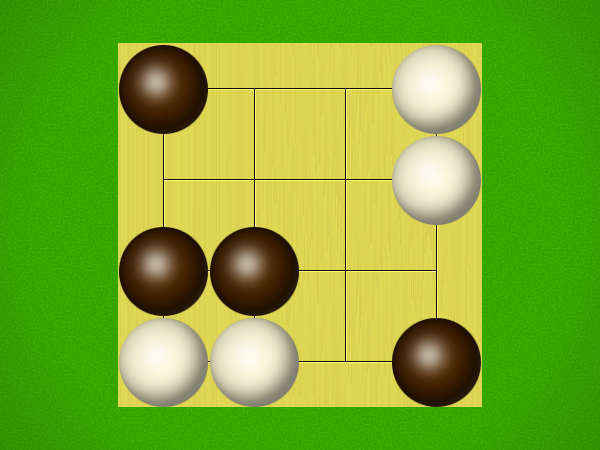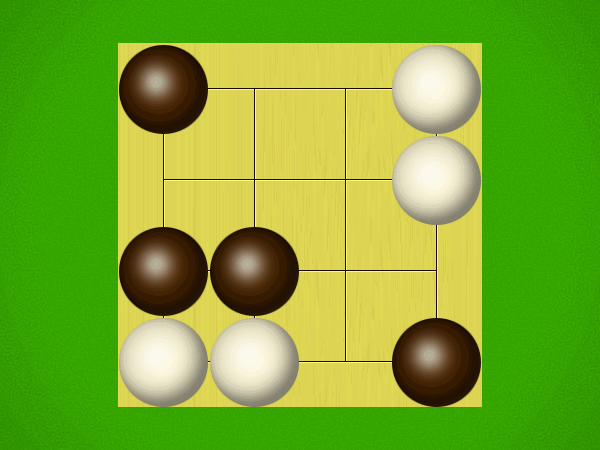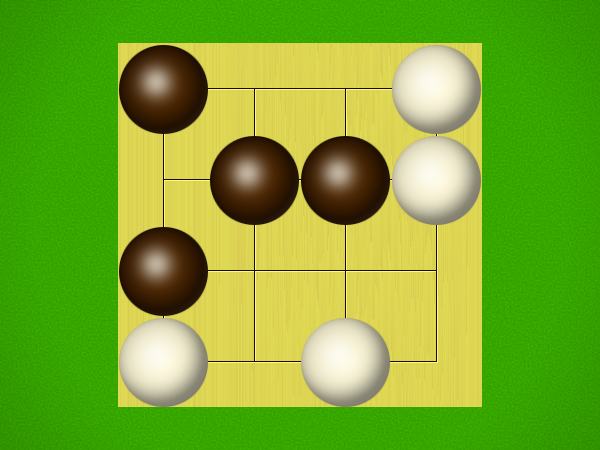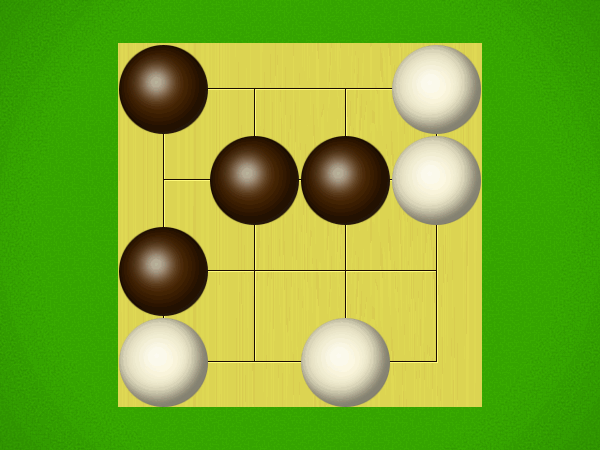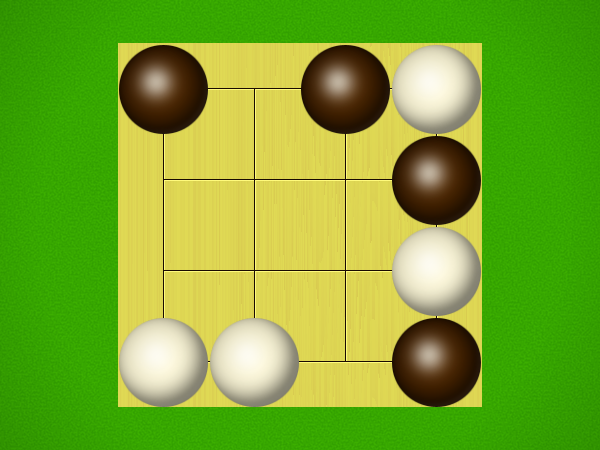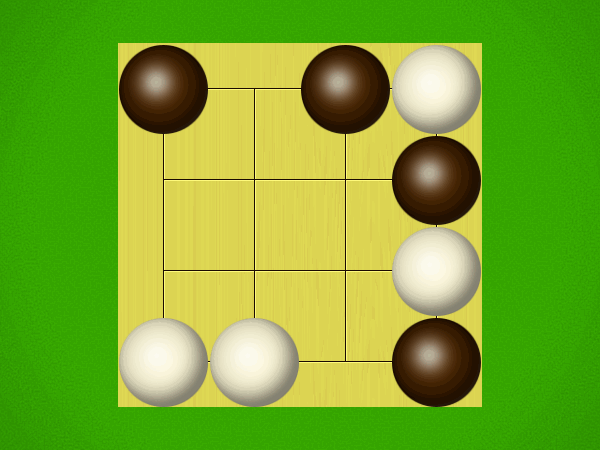| User | Rating | Comment |
|---|
| MrCryptic | 6.5 | |
| Ebon Wendigo | 2 | Nice componants but game is broken. |
| Arcangelurbano | 6.5 | |
| jchobbs | 6 | |
| Red Dragon | 4.5 | About Nine Mens Morris level of simplicity: 8 pieces all the same on a board with 16 spaces all the same. It makes an ok game to pass a little time, if nothing else is available, but that's all this game will ever be. |
| Geosphere | 6 | It feels drawish/stalemateish, although I've yet to see it happen. |
| Willward | 6 | One of the solved abstracts that still maintains its playability. The deluxe version with a bamboo mat and container is bookshelf-worthy. Nice! |
| werdynerdy | 6 | |
| jkgrence | 1 | Terrible, terrible game. All the strategy and excitement of tic-tac-toe, and costs at least 20 dollars more to boot. |
| bayspiel | N/A | 05.01.01.01 |
| Gnomekin | 4.5 | Some interesting ideas ultimately flawed by indefinite stalemate conditions. |
| Sobriquet | 4 | Many Dao sets are very nice to look at, but the game suffers from stalemates between equal players. Not very engaging as a consequence. |
| Thaumaturge | 6 | |
| fogus | 4.3 | [2015.07.10] I typically like these little, simple abstracts, but this one fell flat for me. The 1PA was too string in my plays. |
| Kuzai | 6 | |
| Luke the Flaming | 4 | [Played once] Simple abstract game that can drag on forever. |
| weishaupt | 6 | Decent abstract game. Don't get misled by the simple rules and apparently basic gameplay. |
| Cognisams | 6.5 | |
| wispwalker | 6 | |
| Chrysophylax | 1 | Futility. Tic-Tac-Toe with stones.. 4x4 instead of 3x3 and movable pieces instead of irrevocably claimed territories. But still Tic-Tac-Toe, and as with Tic-Tac-Toe, the only way an experienced player can win or lose is if someone makes a mistake. [i]"There's no way to win. The game itself is pointless!" - Stephen Falken, WarGames[/i] |
| AgentJQ | 7 | |
| jeffwiles | 6 | |
| Quixote171 | 4 | Feels like advanced Tic-Tac-Toe. Meh. |
| B Weage | 2 | Glorified Tic-Tac-Toe that is not only harder to explain (making it less appropriate for the age range that might be able to stand playing it) but also shorter on fun. |
| sproutgrrl | N/A | X |
| kenwood77 | 6 | |
| DJZachLorton | N/A | Deluxe version. |
| PooEater | 7 | |
| Tikigod | 6 | |
| sparkin84 | 7 | |
| ellyssian | 6 | Mr. B was really excited about this game for a while. It's okay, not a favorite. |
| cad614 | 6 | It's a nice easy game that takes seconds to learn and anyone can play. This is also the game I introduce people to when they ask what type of weird games I play. When not at home I improvise by drawing a "board" on a piece of paper and use coins (heads/tails) as pieces. |
| gamemark | 4 | Nicest thing I can say about this simple game... you got a set of those cool Chinese meditation balls to play with. |
| matthan | 3 | It appears the only way you can win is if your opponent makes a mistake. Broken Game. |
| Rozik | 6 | |
| raymondgwalker | 6 | |
| penguinofdoom | 6 | |
| MisterMelon | 8 | |
| Flamer Shaftglutton | 6.7 | Quick but surprisingly deep. It may appear similar to tic-tac-toe from the outside, but is considerably deeper than that. You've got to trick your opponent. It's very easy to block your opponent, so you've got to make moves in your favor look like you're blocking your opponent. |
| Namrok | 6 | |
| BobDodgerBlue | N/A | 1031 |
| jilko | 2 | Horrible game. Just keep playing until one of you makes a mistake, then the other capitalizes on it. There's no question that it is, in fact, MORE than tic-tac-toe, but that's not very high praise, now, is it? |
| asekga | 8 | |
| BeastBen | 7 | (Version Bamboo) Le jeu est super beau, en deux minute les regles sont expliquer et une partie dure moins de 10 minutes. Si les deux joueurs sont au meme niveau, la partie peut devenir vraiment intense!!! |
| indigopotter | N/A | New in shrink. Thrift list: http://boardgamegeek.com/geeklist/58758/item/1406670#item1406670 |
| seneca29 | 6 | I see no reason to play this when I can play Farook. Dao seems solvable and prone to drawish stalemate (homemade) |
| parliboy | N/A | 4x4 board equals not a lot of decision-making in an abstract game where pieces have no powers. But it was a gift, and it's the thought that counts. |
| LosSchabossDragon | 10 | |
| CarlosLuna | 8 | |
| pattonre | 7 | Another game that I never bothered to spend money on for an artsy and expensive set. Made my own to play. |
| Gamethyme | 6 | |
| TempNinjaLee | 6 | |
| chuji | 7 | |
| Graybillion | 6 | |
| Bien | 5 | Abstract |
| strings | 5 | Seems like a pleasant enough little filler, stones make a satisfying sound as you slide them across the bamboo. |
| ecoboardgeek123 | 6.5 | |
| kgnunn | 6 | |
| Janik013 | 7 | |
| kimba | 6 | |
| Super633K | 7 | |
| Lejade | 4 | I own a very nice "bamboo box & smooth stones" edition of this game. Unfortunately gameplay isn't as nice. It reminds me of chinese tic-tac-toe in the sense that when two decent players compete, the game will keep going as the players circle each other waiting for a mistake... which may never come! |
| dancingdanslc | 4 | DIGITAL PLAY: iPad Air Abstract strategy game. Boring abstract Out of my collection |
| lwheeler | 3 | (harmony ball version) The components are nice, but not for this game! The game never ends. |
| Blue Steel | 7 | |
| Connatic | 6 | |
| laurentdeenen | 5 | 2p |
| Talisinbear | 5 | OK light filler |
| Drewopoly | N/A | Complete |
| herace | 10 | |
| Ikarus | N/A | # P&P |
| Skyjack | 7 | |
| bmuchortow | 6.5 | |
| rtrowan | 6 | |
| djnesq | 4 | I'm not sure you can force a win in this game, even with perfect play. You have to wait for the other guy to make a mistake. |
| ssortiz | 7 | |
| Caribbean | 6 | Good game! |
| LtSykes | 5 | I have a lot of mixed feelings for this game. I got it when I was on a kick, looking for new abstract strategy games. I wish I had known all the rules and pieces before hand, because I didn't need to waste twenty bucks on this since I could have made it myself. That being said it is easy to take everywhere and is surprisingly deep psychologically for a game that doesn't have much to it. |
| starfox634 | 6 | |
| hippiephysicschick | N/A | 2p abstract thrifted No box in knight moves |
| Eric Ridley | 4.9 | Seems like this game could devolve in to just moving for the sake of moving. And it did with me. |
| davidabradley | 9 | |
| Grainknight | 7 | |
| ProgressorM | 4 | Has obvious flaws |
| amtorgerson | 6 | |
| Drewcooter | 6 | Nice bits, cool abstract, my 11 year old daughter really digs it, |
| Choukou | 7 | |
| ElHijodeEloisa | 7 | |
| Asmoridin | 5 | I've only played it once, and it was pretty good for the one game. Allowing the whole '4 corners' set-up being a win condition was nice (for my opponent), as I totally didn't even see it coming, meaning you can get some good bluffing in. However, I really think this game would lose some of its replay value if I played it more often. I could just see myself having less and less fun with more plays. |
| astanix | 6.5 | |
| arhenius | 6 | |
| SOCIOJEUX | N/A | Sur les tablettes de l'Espace Sociojeux |
| SaraStorm | 8 | |
| Nap16 | 6 | Free Print & Play. Awards: Mensa Select 2001. |
| PnoiKoji | 7 | |
| Teriyaki Donuts | N/A | Needs to be played. |
| zodball | 6 | |
| plaidpants | 2 | Easy to make a homemade version. Similar to Brandubh which is better. |
| amwiles | 6 | An okay abstract. Very portable, but I wouldn't want to play it more than twice in a row. Games can take too long against equally matched players. Flinching is bad. |
| D Erasmus | 3 | Keeps my kids busy quite a bit. Not much fun as they got older. Game can go on forever as the strategy is pretty simple. |
| Galion | 6 | I don't fully understand the rules, despite, or perhaps because of, their brevity. |
| AlexBeresford | 6 | |
| kromatic | 7 | Two-player game that can be taught in two minutes, but allows for as much depth as the players can imbue. (Rated relative to other 2p games) |
| MrKorky | 7 | |
| JuliaZ | 6.5 | |
| Impr3ssion | 6 | Beats tic-tac-toe! My brother got this for me as a gift, and I like that version's glass pieces and mouse-pad board. The difficulty of trying to win without giving the other person an opening makes this an intense game. I know it's solved and whatnot, but I like it. |
| rampantdragon | 6 | |
| hojoh | N/A | F |
| kaiser | 5 | Interesting and quick game for 2 players |
| The Abstractionist | N/A | Comes in a metal box. |
| Salabesh | 6 | |
| tetsuo13 | 6 | |
| fxcafe | 9 | |
| gjfleischman | 8 | |
| bhorner | 7.5 | |
| MrTacoBueno | 7 | |
| markus_kt | 3 | More a puzzle than a game. |
| Austincd27 | 8 | |
| KyleWyatt | 7 | Simple gameplay, but very engaging. Gametime varies on how long it takes someone to make one simple mistake. |
| amortera | 8 | 1 |
| Conmoy | 7 | |
| CDRodeffer | 3 | As it is, the game is almost certainly a forced draw, and thus broken, except for the uninitiated. But perhaps it could be fixed? One possibility would be to give each player an initial number of chips (say, 3) that could be used to strategically stop a piece before it hits a wall or another piece. With some tweaking, my rating for Dao may improve. |
| Quentak | 7 | |
| Larryfromcarync | 6 | |
| darthnice | 6 | |
| aewhite | 6 | |
| vandemonium | 7 | Gift from the in-laws. I had asked for Grass - not realizing - really! - of the pot reference. :shake: Anyhow, they got this for me instead :blush: and it is a nifty little abstract. The wife and I have played it quite a bit. Recommended for a light, quick, fun abstract. I'd call it a filler abstract. That is not pejorative - it just is a quick fun little game. And it has no references to drugs, at least of which I am aware :shake: |
| LudoMC | 6 | |
| fazerfora | N/A | $3 |
| Audiovore | 9 | |
| jjferry1974 | N/A | Checked & is complete |
| wookie1 | 2 | Hmmm...The game is better then tic-tac-toe...but not by much. Update: This game is a totalal yawn fest....I actually threw this game out in the garbage ...good riddance! |
| jobby | 6 | |
| pulla | 5 | I just don't like abstracts. Rating based on just one play. |
| Mike_Rutch | 7 | |
| runicfox | 7 | |
| d3jg | 8.5 | |
| gr9yfox | 4 | Very simple abstract game with a streamlined rule set. Push pieces as far as they can move in a single direction and try to achieve one of the three possible ending conditions. It is easy to get into stalemates and the optimal move is obvious most of the time. |
| MeepleMaven | 5.5 | Bamboo mat version - needs quality components to enhance game play. |
| red_mary | N/A | Nicolas |
| szoffi | N/A | mi ez, jo ajandeknak? |
| Kaffedrake | 4 | Small tactical abstract where pieces slide on ice. Superficially similar to Farook, which I would prefer. |
| croyalporter | 7 | Quick and pretty fun. Just don't be the first one to make a mistake. |
| Count Gregor | 6 | |
| Rolwin | 6 | |
| NanaChris | N/A | Sean taught me how to play this using the Ceega board |
| emaverie | 8 | |
| dbucak | 3 | Degenerates into a stalemate fairly quickly. |
| fokos | 6.5 | A nice abstract game for two.Unfortunately is gives me the feeling that its determined by the first mistake |
| SEb. | 6 | |
| finallyiamnoone | 7 | |
| JeffStone | 6 | |
| ScaperDeage | 6 | |
| AndrePOR | N/A | Print & Play Edition |
| boujacahin | 8 | You have to have nerves of steel and tons of patience for this game because unlike chess or go, the board is much smaller and pieces are not added or removed. Each move has to be offensive and defensive. People who only focusing on what they do will lose, as will those who only focus on what the opponent does. |
